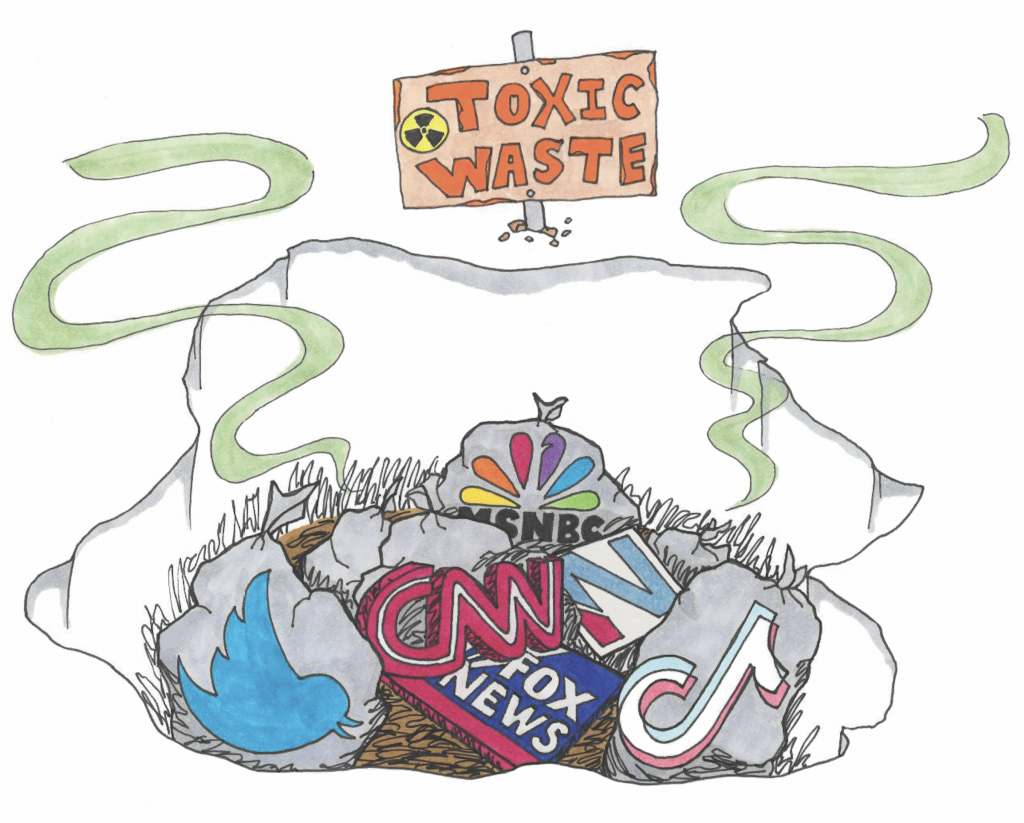If it bleeds, it leads. That’s the grand proverb used in journalistic circles, an axiom recognizing that humanity is naturally drawn to conflict and sensationalism. When we pass by a car accident, we slow down to take a peek at the ruined vehicles before driving off. Humanity is fraught with this curse, having an innate desire to consume bad news.
Political media knows this and capitalizes on it.
We don’t turn on the news and hear positivity. We don’t even expect positivity, yet we feel the need to come back to watch more. If we’re honest, we mostly check the news when something dramatic or negative has happened.
After all, Tucker Carlson doesn’t have the most-watched show on political television because he talks about sunshine, lollipops and rainbows — quite the contrary. Tucker’s dedicated listeners eagerly sit through an hour of FBI weaponization, vaccine mandates and the collapse of law and order, among any number of fearmongering subjects. Sure, some of what he discusses on his show is actually the news, but I question the merits of the entire infotainment machine that churns out slop we crave with each airing.
But this isn’t just a Tucker problem — he is an example of the industry as a whole, including sources both sides of the political aisle consume religiously.
Turn on Fox News, and you can bet they’re talking about the radical left’s indoctrination of children or the invasion at the southern border. On CNN, far-right conspiracy theorists want to overthrow democracy while they continue to focus on former President Donald Trump mishandling nuclear secrets. Open Twitter or TikTok — where everyone is an intellectual political expert — and you find the most mind-numbing and almost satirical statements on political issues imaginable.

In the name of “staying informed about politics,” we subject ourselves to the landfill of toxic news coverage to “know what’s going on” — at least what we think is going on.
But are we even being told what’s really happening, or are we being told what we want to hear? After all, news companies are businesses, and they want people to consume news from their program. They’re not going to discuss what doesn’t make us come back. They’re going to talk about whatever keeps us watching.
It’s the nature of the business, and it’s the nature of consuming political news. We listen to what we want to hear, and news companies are fully aware of this.
Look at the conservative media battleground. Fox News, Newsmax and One American News Network, the three news sources fighting for the right wing’s attention, have entered into competition for the dedication of news junkie Conservatives.
Newsmax and OANN have siphoned viewers from Fox News, especially with the shift President Trump brought to the media landscape. Newsmax has labeled Fox News, once the monopoly of conservative media, as “going woke,” and their anchors have questioned a possible “hard-left turn.” Fox News has found a diminished influence among some Conservatives because other sources have appealed to those dissatisfied with Fox News’ presentation of news.
Conservatives and Liberals both succumb to news sources that capture their attention. It’s like calling the sky blue when saying that Conservatives watch conservative news and Liberals watch liberal news — they both want to hear what they want to hear. Media giants on both sides purposefully appeal to our partisan behavior and the tribalism that splits the United States into two factions.
Conservative news talks about how bad Democrats are, and liberal media bashes Republicans. Both sides of the aisle would agree that the outlook of the world is negative, each with their own reasoning as to why.
We know, or at least should become aware of, our love-to-hate relationship with bad news, yet we often allow the media to take advantage of this behavior. We huddle up in our partisan tents and watch how bad the outside world is from the window our trusted news seems to provide.
We must ask this question when analyzing our news consumption habits: “Why am I watching this?” It is imperative to discern what makes the news appeal to us. Is it because it confirms our biases? Is it because we get a tinge of excitement when we view the sensational?
Why are we so quick to revisit the toxic landfill that is political media?
Browder is the opinion editor for the Liberty Champion

